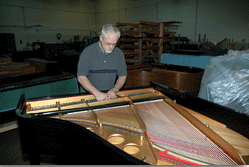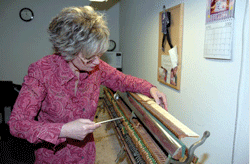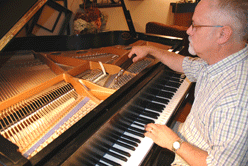FAQs
How often should my piano be tuned? Piano manufactures recommend that pianos should be tuned every six months to a year. Pianos go out of tune whether they are played or not. There are three basic reasons that your piano goes out of tune:
^back to top Should my piano be tuned every time I move it? Your piano should be tuned when it is moved from one address to another, since it will be in a new environment with a different atmosphere. Moving the piano on and off the truck will also affect the tuning. If you are moving your piano within the same room or same house, it probably does not need to be tuned. ^back to top  What does "pitch raising" mean and why is it
necessary? What does "pitch raising" mean and why is it
necessary?A piano is designed to sound its best when tuned to A440 (A above middle C vibrates at exactly 440 cycles per second). It has been designed to perform at a specific tension, and when strings stretch beyond, or drop below this tension, pitch adjustments are required to bring it back to A440. Through neglect, pianos may deviate from this standard, making them unsuitable to play with other instruments and causing them to lose market value. So, first the tuner must raise all the strings to their proper average tension levels, and only then can the piano be accurately tuned. This is called a "pitch raise." A pitch raise requires more time and effort than a regular tuning, and as a result, the piano technician's fee is a bit higher. In addition, lower pitched instruments can compromise the pianist's ear training. ^back to top Where can I place my piano? You want to place your piano where its environment is most stable. You do not want to place your piano:
^back to top Is my piano good enough for my child to learn on? There are two basic criteria for the piano so your child can have a productive and enjoyable experience:
^back to top  What is regulation and how does it affect my piano's
performance? What is regulation and how does it affect my piano's
performance?Regulation is the adjustment of the mechanical aspects of the piano to compensate for the effects of wear, the compacting and settling of cloth, felt, and buckskin, as well as dimensional changes in wood and wool parts due to changes in humidity. The three systems involved in regulation are the action, trapwork and damper system. The action is the mechanical part of the piano that transfers the motion of the fingers on the keys to the hammers that strike the strings. It is comprised of over 9,000 parts which require adjustment to critical tolerances to be able to respond to a pianist's every command. The trapwork is the assemblage of levers, dowels and springs that connects the pedals to the action affecting sustain and dynamics. The damper system is the mechanical part of the piano that stops the vibration of the string when you release the key and is controlled by the key and pedal systems. ^back to top What are the signs that my piano needs regulation? If your instrument displays a lack of sensitivity or decreased dynamic ranges, it is a candidate for regulation. If you notice that the keys are not level (some higher or lower than the rest), the touch is uneven or that the keys are sticking, the need for regulation is indicated. However, a sluggish action or deep grooves in the hammers indicate the need for reconditioning or repair. Ask your technicians to show you what needs adjustment on your piano. No amount of practice can compensate for a poorly maintained action. Poor legato touch, chord playing where all notes of the chord don't speak clearly, a gradual loss of subtlety in phrasing and an inability to execute quick passages or note repetitions evenly may be the fault of the piano -- not the player. ^back to top Why is reconditioning or rebuilding of the mechanical systems sometimes necessary prior to regulation? Prior to regulation, your technician will assess the condition of your instrument. If it has badly worn parts or if there has been corrosion or moth damage, the piano may not be able to be properly regulated without some repair or replacement of parts. Reconditioning is the process of putting your piano back in good condition by cleaning, repairing, and adjusting your instrument for maximum performance with replacement parts only where specifically indicated. If you piano has deteriorated beyond simple reconditioning, it may need to be rebuilt. Rebuilding involves complete disassembly, inspection and repair as necessary with replacement of all worn or deteriorated parts. The piano is then reassembled, tested and adjusted to the same or similar tolerance and performance as when it was new. Your piano is a major investment which deserves to be protected through regular servicing by a qualified technician. Properly maintained, your piano will sound its best and give you and your family a lifetime of enjoyment ^back to top |


